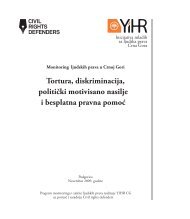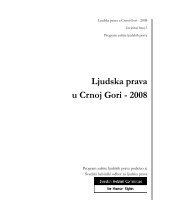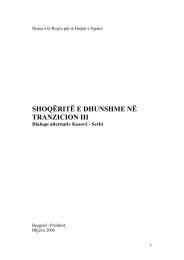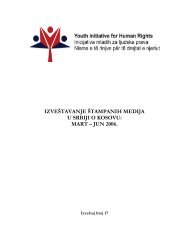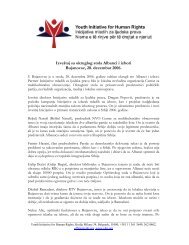Implementation of Transitional Laws in Serbia 2006
Implementation of Transitional Laws in Serbia 2006 - Archive
Implementation of Transitional Laws in Serbia 2006 - Archive
- No tags were found...
You also want an ePaper? Increase the reach of your titles
YUMPU automatically turns print PDFs into web optimized ePapers that Google loves.
<strong>Implementation</strong> <strong>of</strong> <strong>Transitional</strong> <strong>Laws</strong> <strong>in</strong> <strong>Serbia</strong> <strong>2006</strong>Constitution <strong>in</strong> which the jurisdictions <strong>of</strong> the Constitutional court are listed,there is no explicitly stated jurisdiction over the decisions on constitutionalappeals!In the Constitution <strong>of</strong> <strong>Serbia</strong>, the field <strong>of</strong> <strong>in</strong>dividual petitions <strong>of</strong> citizensto the <strong>in</strong>ternational bodies for the protection <strong>of</strong> human rights is verypoorly regulated. The Constitution states: citizens have a right to turn to<strong>in</strong>ternational <strong>in</strong>stitutions for the protection <strong>of</strong> their freedoms guaranteed bythe Constitution. In the Small Charter it was explicitly stated that the stateis obliged to carry out the decisions <strong>of</strong> the <strong>in</strong>ternational organs, as well asto compensate for damages 53 . Also, unlike the Small Charter, which speaks<strong>of</strong> the rights guaranteed by the <strong>in</strong>ternational contract valid <strong>in</strong> the territory<strong>of</strong> <strong>Serbia</strong> and Montenegro 54 , the Constitution is limited only to the rightsguaranteed by the Constitution. It is unclear how the courts <strong>in</strong> <strong>Serbia</strong> willact if an <strong>in</strong>ternational organ (for example the European Court for HumanRights) decides that a citizen’s right, which has not been regulated by theConstitution, was violated (for example the right to a private life). Will thedecisions <strong>of</strong> the court be carried out, or will <strong>Serbia</strong> have to step out <strong>of</strong> themembership <strong>in</strong> the Council <strong>of</strong> Europe?Right to Freedom and SecurityArticle 27Everyone has the right to personal freedom and security. Depriv<strong>in</strong>g <strong>of</strong> liberty shall be allowedonly on the grounds and <strong>in</strong> a procedure stipulated by the law.Any person deprived <strong>of</strong> liberty by a state body shall be <strong>in</strong>formed promptly <strong>in</strong> a language theyunderstand about the grounds for arrest or detention, charges brought aga<strong>in</strong>st them, and theirrights to <strong>in</strong>form any person <strong>of</strong> their choice about their arrest or detention without delay.Any person deprived <strong>of</strong> liberty shall have the right to <strong>in</strong>itiate proceed<strong>in</strong>gs where the court shallreview the lawfulness <strong>of</strong> arrest or detention and order the release if the arrest or detention wasaga<strong>in</strong>st the law.Any sentence which <strong>in</strong>cludes deprivation <strong>of</strong> liberty may be proclaimed solely by the court.Unlike the Small Charter, the Constitution omits an important regulationthat is an <strong>in</strong>tegral part <strong>of</strong> the right to freedom and security: the prohibition53 Ibid, Paragraph 354 Ibid19



